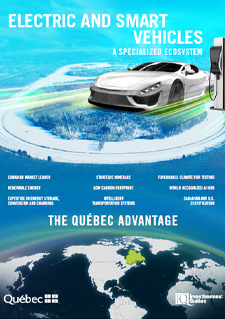
Ground transportation
Electricity: Powering the future!
More than 97% of all the energy produced in Québec is renewable, with nearly all of it coming from hydropower. The combination of hydropower and the Québec transportation industry’s research expertise and technical know-how makes the province the ideal spot for entrepreneurs and investors looking to advance the electric vehicle industry.
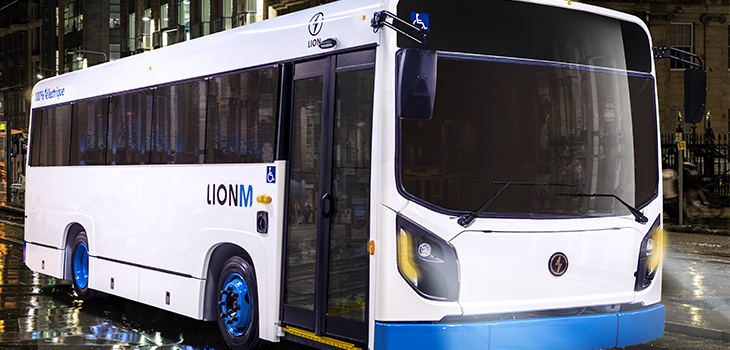
The very first 100% electric minibus entirely designed in Québec was launched by The Lion Electric Co., in May 2018, in Montréal. Built to respect the requirements for paratransit and public transit, the LionM can accommodate from 8 to 22 passengers and run up to 240 km on a single charge with two swappable batteries. And that’s not all: by 2019, the company will unveil its first electric urban truck, based on the LionM minibus.

Québec company AddÉnergie, a pioneer in charging solutions for electric vehicles designed for the North American market, now operates the second largest network in Canada, with 12,000 charging stations and 60,000 drivers. After a successful breakthrough in the United States in 2017, it will soon be looking to Europe and, in the longer term, the Middle East and Africa.
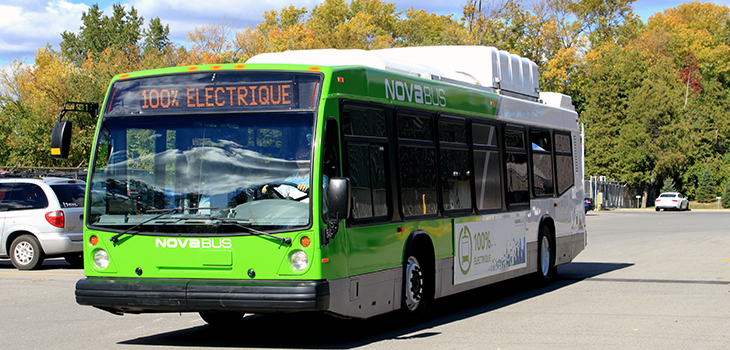
Fully electric buses designed by Nova Bus
 , member of Volvo Group, are now in service in Montréal. These buses were commissioned as part of City Mobility program from Volvo Group and Nova Bus, making Montréal the first North American city to take part in this initiative. Montréal plans to have electric vehicles account for 95% of its bus fleet by 2030 and to reach its target of zero GHG emissions by 2040.
, member of Volvo Group, are now in service in Montréal. These buses were commissioned as part of City Mobility program from Volvo Group and Nova Bus, making Montréal the first North American city to take part in this initiative. Montréal plans to have electric vehicles account for 95% of its bus fleet by 2030 and to reach its target of zero GHG emissions by 2040.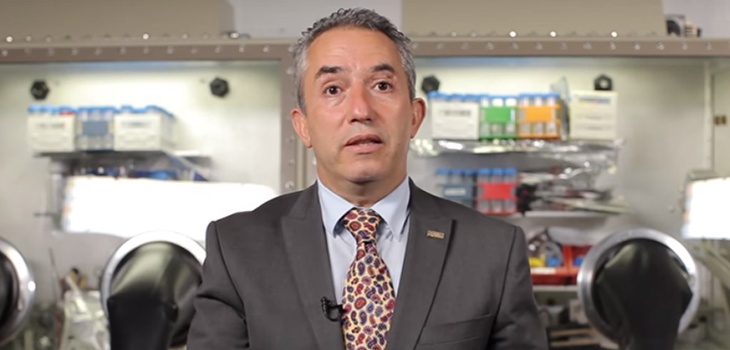
We will soon be able to power electric cars with solar photovoltaic energy, thanks to work carried out by a team headed by Québec researcher Karim Zaghib—considered one of The World’s Most Influential Scientific Minds. The team is currently developing a battery capable of harnessing and storing light to use it as an energy source. A global first, this innovation could be put on the market by 2022.
Québec has been working actively for many years to electrify its transportation system with a view to securing economic and environmental benefits.
The electric vehicle sector is an engine for creating collective wealth and an innovative way to substantially cut greenhouse gas emissions in Québec and around the globe.
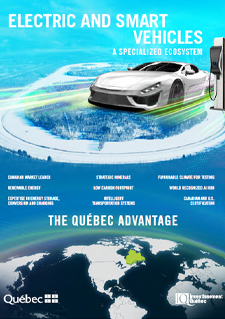 Québec, a world recognized hub world pole in transport electrification!
Québec, a world recognized hub world pole in transport electrification!
Intelligent transportation systems, expertise in energy storage, conversion and recharging, renewable energy, a favourable climate for testing: discover the competitive advantages that make Québec a key player in the electrification of transportation!
A fully automated electric light-rail network in Montréal by 2022
Montréal will have its own integrated and fully automated electric light-rail transit system by the end of 2022! The new REM train project, which will add 67 km of rails to the city’s public transit system, is set to become the third-largest automated transportation system in the world after Dubai (80 km) and Vancouver (68 km), just ahead of Singapore (65 km).
For the metropolitan area, the REM will be the largest public transportation infrastructure built since the Montréal subway, inaugurated in 1966. The REM will usher in a new era of public transit development in the Greater Montréal area. The new network represents an investment of approximately $5.5 billion. It is expected to generate approximately 7,500 jobs annually during the construction phase, and more than 1,000 permanent jobs once in operation.
Hydro-Québec invests in the development of electric mobility !
As a government corporation that generates, transports and distributes electricity, Hydro-Québec has what it takes to develop electric mobility: clean, renewable energy, a reliable power grid, recognized expertise and promising technologies.
- At its initiative, the first public charging network in Canada, the Electric Circuit, was launched in spring 2012. Since then, over 500 charging stations (including some 20 fast chargers) have been set up, and over 120 private and institutional partners have joined the Electric Circuit.
- In partnership with the city of Montréal, the Electric Circuit also ensures the installation of fast chargers along major roads, as well as on-street charging stations adapted for winter conditions.
- In partnership with the Institute of Bioengineering and Nanotechnology (IBN) in Singapore, IREQ has perfected silicates for use in
next-generation batteries, potentially doubling their storage capacity when compared to current models. - IREQ has also completed a V2G-V2H pilot project to test whether an electric vehicle battery can be used to conduct energy exchanges with the grid or to power part of a home during an outage.
Other
sites
Productivité innovation website (in French only)
Compétivert(in French only)








